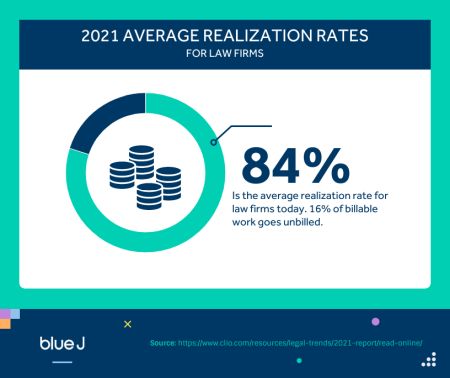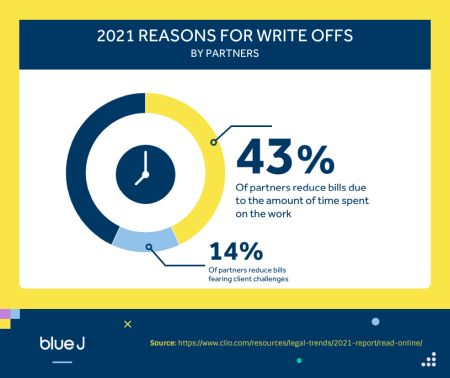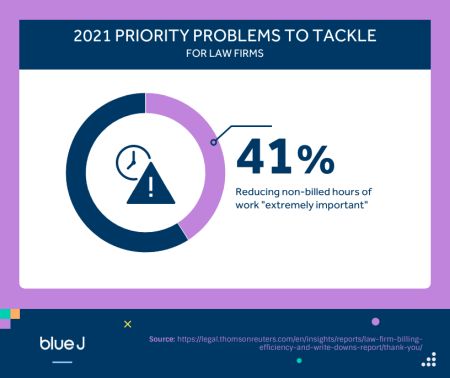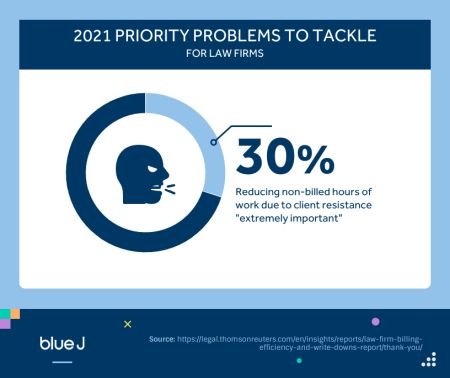The Clio Legal Trends Report 2021 surveyed just over 2,000 individuals - 1,056 legal professionals, and 1,002 US-based Clio users. The survey explored how much growth firms have seen, their biggest challenges to continued growth, and the role technology has played.
The key findings included an average realization rate of only 84% across firms, and that high-growth firms are the ones adopting new technologies to operate more efficiently and provide better customer service.
Thomson Reuters also released a Law Firm Billing Efficiency and Write Downs Report, that looks at the primary reasons for write offs within firms. The biggest reasons are the time spent on research and client pushback on bills.
When we look at findings from these reports together we can see that achieving more efficient workflows is critical to reducing write offs and improving profitability across firms.
Low realization rates hinder profitability
According to Clio's Legal Trends Report 2021, the average law firm achieves 84% realization rates, significantly undercutting their profitability. The report explored potential reasons for why 16% of billable hours are going unbilled at a firm.

One possible reason is that lawyers are underestimating the time legal matters will actually take them to complete, and then choose not to charge their clients for the additional time spent.
This would be a classic case of outrage constraint, the fear that clients will be upset when their bill is higher than expected. Ruffling client feathers is something many lawyers hope to mitigate by underreporting valid billable work. It can sour the firm's relationship with clients, make them appear unskilled, and lead to churn or just lead to lower collection rates.
In the case of tax lawyers (part of the Blue J user base), rapidly changing tax legislation in recent years has left them with far less clarity into the law and with far more statutes and regulations to understand and interpret. As a result, they spend far more time on research and analysis than before but are also reluctant to bill for the entirety of it.
Alternatively, lawyers may knowingly provide tight turnaround times under pressure to stay competitive and hold onto valuable clients, and then underreport the actual hours worked to avoid frustrating their clients.
The end result remains the same, an unsustainable model for growth and profitability. The study noted a strong correlation between law firm growth and improved realization rates.
Research inefficiency a big problem for law firms
The Thomson Reuters Law Firm Billing Efficiency and Write Downs Report sheds light on the questions the Clio report raises: where are these valuable hours being lost?
One major finding of the report was that: 43% of partners reduce a bill because the time spent exceeds the partner's expectations, while 14% report reducing a bill because they are concerned the client will challenge the bill.

When asked about work tasks that lead to lost time, the three most common reasons partners gave were: the junior associate learning curve, an associate or staff took longer than expected to complete a task, and online legal research.
The report also looked at why partners don't report their own time worked. The number one reason is that they were getting up to speed on a new or unfamiliar area of law.
With excessive non-billed work, the profitability for a firm is undercut, and the profitability of law practices is also reduced. It's no wonder that reducing non-billed work is a high priority for a number of firms. 41% of partners rate reducing the amount of hours that are worked but not billed as "extremely important. 94% of partners in total, felt that reducing the amount of hours worked but not billed as important - varying from extremely to somewhat. This tells us that there is a large appetite for creating greater efficiency within attorney workflows as a way to reduce non-billed time.

Interestingly, the report found that partners were most likely to rate reducing the amount of time not billed due to clients' unwillingness to pay for certain costs as "extremely important" - 30%

Why do write offs occur so often if they are a clear indicator of inefficiency, lost time and lost profitability? One reason may be that the majority of partners, senior associates, and junior associates (67%) all believe that they write off or write down about the same amount of time as other firms.
When a majority of firms believe they are operating at the same efficiency as other firms, the compulsion to make changes may not be so strong. The problem then is that write offs are simply seen as standard practice, rather than something to be addressed immediately to improve profitability. For more efficient research processes with tax law, consider Blue J's Decision Finder - a factor-based solution that helps practitioners find relevant decisions in minutes, rather than hours.
Growing firms are more likely to adopt new technology
Finally, if we look back to the Clio Legal Trends Report 2021, a key finding was that the highest growth firms were more likely to adopt technology that supports firm efficiency and improved client service.
Naturally, the firms using reporting software to track their own key performance metrics closely, are far more aware of their lagging realization rates and their source, making it easier to improve them. Broadly speaking, it's clear that the firms who look to technology to solve problems are far more attractive to clients and poised for continued growth.
When asked what areas respondents would invest in for the future, 61% of respondents said software. Technology represents a lower-cost investment with higher-potential benefits that can positively impact a firm's growth. Other investments like legal and non-legal staff are important but have far greater risks associated with them (hiring, training, retaining), while other expenses like office space are far less important than ever.
Today's legal tech can cut down on non-billable work
Both the Clio and Thomson Reuter reports make one thing very clear - lawyers are in a sticky situation. Non-billable work is necessary, but they compete with the billable time so often relied on to drive profits.
However, there is a growing list of smart software or AI-powered software that can help lawyers work far more efficiently than ever before. Let's take a look at just a few.
To save time spent on non-billable administrative tasks, products like Clio and Practice Panther are popular choices. They expedite functions like sending bills and collecting payments. For both types of tools, their value proposition hinges on efficiency, freeing up time to work on value-adding and potentially billable activities.
There are also new technologies that can help lawyers expedite and monetize legal research, which is an increasing source of non-billable overhead due to heightened cost pressures from clients.
Blue J Tax leverages artificial intelligence to predict legal outcomes in challenging areas of tax and employment law. The tools are up to 100 times faster at finding decisions than traditional research methods, such as keyword and Boolean searches. The software is also on average 90%+ accurate in predicting outcomes on the merits of the situation and considers all relevant past court decisions when computing predictions."
Not only are these tools making legal research more efficient, they're actually improving the quality and comprehensiveness of research, which in turn enables lawyers to provide their clients with the highest quality of legal advice.
The tools to optimize issues around research and billable hours exist - the question remains which firms will take the step forward to adopt them?
The content of this article is intended to provide a general guide to the subject matter. Specialist advice should be sought about your specific circumstances.

